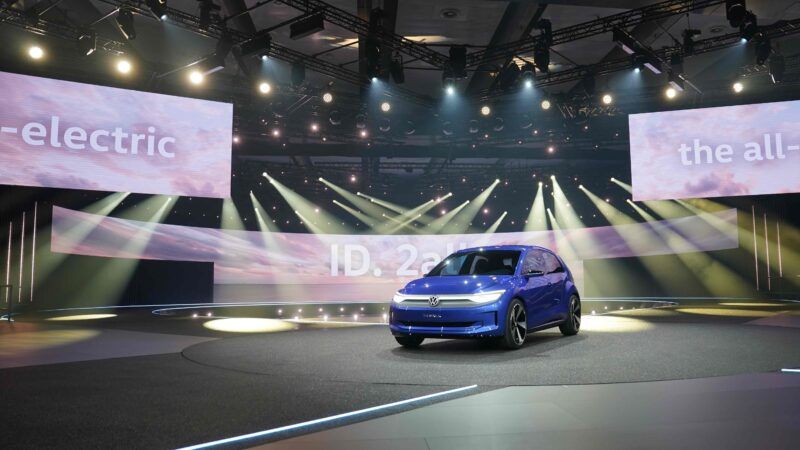The Inflation Reduction Act Is Screwing Up the Market for Electric Vehicles
Volkswagen unveiled a cheap new electric concept car, but protectionist policies mean it's not worthwhile for the company to introduce it in the U.S.

Amid issues like climate change and fluctuations in the global price of oil, American motorists are increasingly interested in electric vehicles (E.V.s). In early 2022, new E.V. registrations rose 60 percent even as overall new car registrations declined by 18 percent.
Of all considerations, the biggest barrier to acceptance is price: The price of the average new E.V. runs nearly $67,000, while the overall average new car costs just under $50,000. Clearly the key to greater adoption of E.V.s is bringing the price down to be more in line with gas-burning alternatives.
Last week, Volkswagen introduced a new concept car, the ID. 2all. The all-electric hatchback boasts a 280-mile range and says it can charge from 10 percent to 80 percent in just 20 minutes. The company plans to sell it for less than €25,000 (around $26,900), roughly the same price as a Toyota Camry.
There's only one problem: Volkswagen has no plans to bring the ID. 2all to the United States. And if it did, it would be at a disadvantage thanks to protectionist policies.
Heatmap noted that the most likely reason why Volkswagen is avoiding the U.S. is that Americans tend to prefer larger vehicles, with trucks and SUVs now accounting for more than 80 percent of new car sales. Volkswagen's own Golf, which is similar in size to the ID. 2all, sold so poorly in recent years that the company discontinued its sale in the United States.
But there will always be a market for cars at entry-level prices, especially for people who just need to get from point A to point B as inexpensively as possible and don't live near mass transit. If that car also insulates its owner from having to worry about fluctuations in the global oil market, even better.
Tesla CEO Elon Musk has promised an affordable Tesla since 2006, including a "confident" pledge to introduce a $25,000 model by 2023, but he has yet to deliver on it. (He's currently the closest he's ever been, with Tesla slashing prices on its Model 3 to $42,990.) The two closest competitors right now are the Chevrolet Bolt and the Nissan Leaf, each of which currently retails for $26,000 and up. But each of those models uses outdated technology that takes much longer than its competitors to charge.
And yet even if Volkswagen wanted to make a play for the budget E.V. market, U.S. law would put it at a competitive disadvantage. As part of last year's Inflation Reduction Act (IRA), Congress established tax credits of up to $7,500 for anyone who purchases an electric vehicle. But the credit has a lot of requirements, including that the vehicle must "undergo final assembly in North America."
Volkswagen does have factories in Tennessee and Mexico; it makes the ID.4 electric SUV in Tennessee and recently pledged over $7 billion toward building out its North American footprint, part of which would "modernize" its factories in Mexico.
But if it wanted to sell the ID. 2all in the U.S. and let buyers take advantage of the tax credit, Volkswagen would have to produce the car here as well. The cost of moving production to the States wouldn't make sense unless the company knew it could sell them in high volumes. Without the tax credit, consumers would likely opt for other models based on artificially lowered prices.
The IRA's E.V. credits were a clear case of economic protectionism. Sen. Joe Manchin (D–W. Va.) opposed the credits on principle but ultimately agreed to them with strict requirements that would exclude E.V.s made in China or with Chinese-sourced materials. As a side effect, this also excludes E.V.s made in the European Union, which Manchin later admitted he hadn't realized at the time.
The Chevrolet Bolt and Nissan Leaf may have outdated charging technology, but they each qualify for the full tax credit; the ID. 2all, if it ever came to America, very likely would not. In a free market, consumers would get to choose the products to buy based on cost and dependability. A choice between a $26,000 electric car that charges in minutes and a $28,000 electric car that charges in hours seems like not much of a choice at all. But when the government, over misplaced protectionist sentiments, uses the tax code to artificially advantage one product over another, it disadvantages not only competitors but consumers.


Show Comments (70)